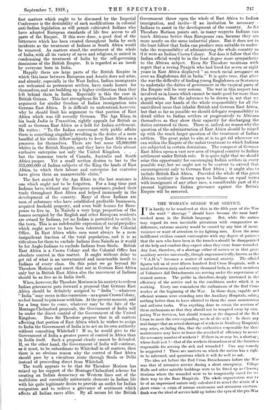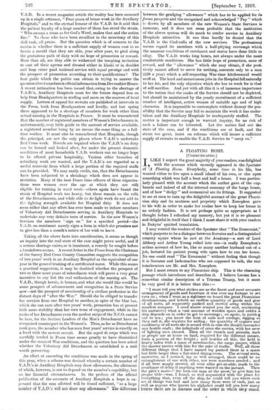THE WOMAN'S SENIOR WAR SERVICE.
IT is hardly to be wondered at that in the fifth year of the War the word " shortage " should have become the most hard- worked noun in the British language. But, while the natioa may regard its own inevitable privations with comparative in- difference, extreme anxiety would be caused by any hint of incon- venience or want of attention to its fighting men. Even the most indifferent civilian cannot contemplate with any degree of patience that the men who have been in the trenches should be disappointed of the help and comfort they expect when they come home•wounded. Any fear, therefore, of a shortage either of nurses or in that groat auxiliary service universally, though ungrammatically, known as the " V.A.D.'s," becomes a matter of national anxiety. The official figures tell us of over fifteen hundred Red Cross Hospitals, with a total of between sixty and seventy thousand beds, in which members of Volunteer Aid Detachments are serving under the supervision or trained nurses. The public is, therefore, deeply interested in 03 efficiency of the service and in the conditions under which it is working. Every one remembers the enthusiasm of the Red Cross worker at the beginning of the War. In those days, capable and efficient women were crowding into the Auxiliary Hospitals, asking nothing better than to have allotted to them the most monotonous and arduous tasks. Was anything done to retain the services of these enthusiasts so that they should not be tempted away by com- peting War Services, but should remain at the disposal of the Rol Cross to meet the ever-expanding needs of the sick ? Is them any real danger that an actual shortage of workers in Auxiliary Hospitah may arise, or, failing this, that the authorities responsible for their maintenance may have to lower the standard of efficiency to secure the necessary number of workers ? If there is, or may be, a shortage, whose fault is it ?—that of the workers themselves or of the Societies responsible for serving the sick and wounded ? Can any remedy be suggested ? These are matters on which the nation has a HO. to be informed, and questions which it will do well to ask.
The idea set before the Red Cross Detachments before the War was that of intensive service during a short emergency. Village Halls and other suitable buildings were to be fitted up as Clearinl Stations where the wounded were to be temporarily cared for o their way to the Base Hospitals. The whole organization was tY be of an improvised nature only calculated to stand the strain of a short crisis—a crisis of intense excitement and strenuous exertion. Such was the ideal of service held up before the eyes of the pre-Wat
V.A.D. In a recent magazine article the reality has been summed up in a single sefitence, " Four years of house weak in the Auxiliary Hospitals," and to the eternal honour of the V.A.D. be it said that the patient loyalty of a large number of them has stood the strain. " Who sweeps a room as for God's Word, makes that and the action fine." To those who have been steadfast in the monotony of this dull task, all praise. But the question which is of concern to the nation is whether there is a sufficient supply of women cast in so heroic a mould that they are able, year after year, to plod along the gratuitous path of duty with no hope of promotion or reward. More than all, are they able to withstand the tempting invitation to cast off their aprons and dressed either in khaki or in doublet and how enter paid national service with equal prestige and with the prospeet of promotion according to their qualifications ? The best guide which the public can obtain in trying to answer the question about numbers is official information from Devonshire Houlie. A recent intimation has been issued that, owing to the shortage of V.A.D.'s, Auxiliary Hospitals must for the future depend less on help from Headquarters in staffing and more on the sources of local supply. Letters of appeal for recruits are published at intervals in the Press, both from Headquarters and locally, and last spring there appeared to be a shortage of members for work other than actual nursing in the Hospitals in France. It must be remembered that the number of registered members of Women's Detachments is, unfortunately, very little guide to the amount of service available, a registered member being by no means the same thing as a full- time worker. It must also be remembered that Hospitals, though the principal, are not the only places where V.A.D.'s undertake Red Cross work. Hostels are required where the V.A.D.'s on duty can be housed and looked after, for under the present domestic conditions of most households V.A.D. workers can no longer hope to be offered private hospitality. Various other branches of subsidiary work are wanted, and the V.A.D.'s are regarded as a useful reservoir from which a large portion of the required staffs can be provided. We may easily credit, too, that the Detachments have been subjected to a shrinkage which does not appear in statistics. Many of the best Peace time officers of these organiza- tions were women over the age at which they are still eligible for training in ward work—others again have found the strain of Hospital work too heavy, but these remain on the rolls of the Detachments, and while able to do light work do not add to tie fighting strength available for Hospital duty. It does not seem either that any effort has ever been made to induce members of Voluntary Aid Detachments serving in Auxiliary Hospitals to undertake any very definite term of service. In the new Women's Services the members " sign on " for a specified period—the V.A.D. on enrolment merely signs a form in which she promises not to give less than a month's notice of her wish to leave.
Taking all the above facts into consideration, it seems as though an inquiry into the real state of the case might prove useful, and if a serious shortage exists, or is imminent, a remedy be sought before a breakdown occurs. A recent letter in the Times from the Chairman of the Surrey Red Cross County Committee suggests the recognition of two years' work in an Auxiliary Hospital as the equivalent of one year in the general training of a certificated nurse. While this seems a practical suggestion, it may be doubted whether the prospect of two or three more years of subordinate work will prove a very great incentive to any but the real enthusiasts of the nursing art. The V.A.D., though heroic, is human, and what she would like would be some prospect of advancement and recognition in a State Service now—not the prospect of membership of a civilian profession in the distant days of "after the War." Should she be obliged to transfer her services from one Hospital to another, in spite of the blue bar, which she can earn after two years' work, promotion has at present little more stability than her own term of engagement, while in the ranks of her Detachment even the modest stripe of the N.C.O. cannot be hers, for the Section Leaders of the Men's Detachment have no recognised counterpart in the Women's. Thus, as far as Detachment rank goes, the member who has seen four years' service is exactly on a level with the newest recruit. But the esprit de corps which was
carefully tended in Peace time seems greatly to have diminished under the strain of War conditions, and the question has been asked whether the Voluntary Aid Detachment as established is a unit worth preserving.
An effort at amending the conditions was made in the spring of this year, when a scheme was devised whereby a certain number of V.A.D.'s in Auxiliary Hospitals may draw allowances, the allotment of which, however, is not to depend on the member's capability, but oil her financial circumstances. In the preface of the official publication of the accounts of Auxiliary Hospitals a hope is ex- pressed that the sum allotted will be found sufficient, "as a large
number of V.A.D.'s will not draw any allowances." The difference between the grudging " allowance " which has to be applied for in. forma pauperis and the recognized and acknowledged " Pay " which is drawn by all members of the new Women's State Services is immense, and it does not seem probable that the institution of the above system will do much to render service in Auxiliary Hospitals attractive. It can thus hardly be denied that the V.A.D. is the Cindarella of the new services. The professional nurses regard its members with a half-pitying contempt which the amateur conditions of enrolment and status have done little to allay. The V.A.D. works long hours, not always under the most comfortable conditions. She has little hope of promotion, none of reward, and the " allowance " which she may obtain, if she posh tively cannot afford to serve for nothing, amounts only to a sum (£20 a year) which a self-respecting War-time kiteheninaid would scoff at. The hard and monotonous jobs in the Hospital fall naturally to her lot, and the only objective which she has to work for is that of self-sacrifice. And yet with all this it is of immense importance to the nation that the ranks of the Service should not be depleted, but should be maintained by the yearly recruitment of a sufficient number of intelligent, active women of suitable age and of high character. It is impossible to contemplate without dismay the pos- sibility that the Service may fail to maintain the work it has under- taken and the Auxiliary Hospitals be inadequately staffed. The matter is important enough to warrant inquiry, for no risk of such a failure can be tolerated. Let the nation find out the state of the case, and if the conditions are at fault, and the strain too great, insist on reforms which will insure a sufficient supply of recruits to enable the V.A.D. Service to " carry on."



























 Previous page
Previous page